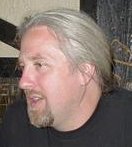Atlas (And the Audience) Shrugged
Went to see Atlas Shrugged last night with the venerable Miss Tessmacher. Lots of hype about the film lately, especially since its doom-and-gloom scenarios have been adopted in the last few years by invasive-government types of all strypes, from Tea Baggers to Libertarians to self-styled quasi-Anarchists. The brief review? It didn't suck, exactly, but it was filled with lots of droning scenes involving talking heads and weaselly politicians. It just…kinda sat there.
Like most folks who actually take the time to read Ayn Rand's 1957 novel of pure, beneficent capitalism, I first encountered Atlas Shrugged as a late-teenager, full of idealism but woefully short on political savvy and an incomplete understanding of the World. Her heroes are godlike in their purity, motivated by selfless selfishness and a sense that they are always - ALWAYS - right. Likewise, her villains are not only purely evil, but of such a disgusting type of evil that they are less satanic than just icky, like a banana slug that has crawled into your armpit. And thus are the battles in Atlas Shrugged overpoweringly unequal. You cannot help but admire Dagny Taggart, Hank Reardon, and all the rest: omnipotent creatures whose sole goal in life is to make money, but who accomplish it without raping the environment, squashing workers or shipping jobs overseas. The political villains who work against Taggart et. al. are hopelessly incompetent, leeches who squander the resources that the Shining Creators give us, unencumbered by any likability.
I think it's rather telling that the book, for all its 1000-page tome-iness, seems to appeal first and foremost to the 18-to-24-year old crowd. Because only people who have a limited brain capacity and wear political blinders could possibly be moved to see anything other than comic-book-style fiction to the work. And, yes, granted: it IS a work of fiction. One that attempts, however, to portray an end-result world specifically skewed by Rand's 1) place, and 2) time of birth. A child of the Russian Revolution, she witnessed firsthand the failing ideals of Soviet-style communism. But in its place, she seems to want to revive a world of benevolent Tsarist capitalism, a society in which the Haves are allowed to keep and do and be what they are, without any harm befalling the Have-Nots. I got news for ya, kiddies: that world don't exist.
Which is partly her point. Or, rather, partly her slanted point. Which is to say, she seems to present the reasons for the non-existence of that world as a by-product of foolish men who keep down the Benevolent Creators, robbing them of both their finances and, finally, their will. Selfishness is a virtue to her heroes, and a reprehensible vice to her villains. But only in fiction could such a black-and-white world exist. It's as if Atlas Shrugged is a comic book without the costumes: infallible heroes with no known faults (like a boring, '50s-era Superman) set against a world of corrupt Brainiacs…only minus the capes and secret identities. It's not that the world she desires doesn't exist because worthless scum disable its appearance: it's that that world can't exist because there are no benevolent dictators.
That's what Reardon, and Taggart, and all the rest of them are: benevolent dictators, completely possessed of all the power and ability, who then bestow upon us little people the fruits of their labor and creative prowess. But dictators are never benevolent, and absolute power still corrupts absolutely. Businesses are NOT "in business" to create jobs; they are in business to create the maximum profit for their shareholders. In Rand's world, the CEO of BP would be the hero, drilling an ocean of oil and natural gas to power the world. In reality, the CEO of BP presided over a company that polluted the ocean with oil because he tried to do it as cheaply as possible. That's what you never get to see from these Randian super-capitalists: the net result of their very capitalism. There are no underpaid workers, there is no environmental calamity…everyone lives in parasitic peace and harmony, knowing their place in the pecking order and accepting it unquestioningly.
Thanks, but no thanks. I would never stand up and advocate Communism, because of course that idea can't work either: eventually, someone decides that in a world of "everyone is equal," I'm actually a little MORE equal than you. But Rand would return us to a world of dictatorial nobility, where the noble class are the super-rich merchants and creators, and everyone else happily works for them. Political and social reality just isn't that black-or-white. The truth, as always, is much murkier.



0 Comments:
Post a Comment
<< Home